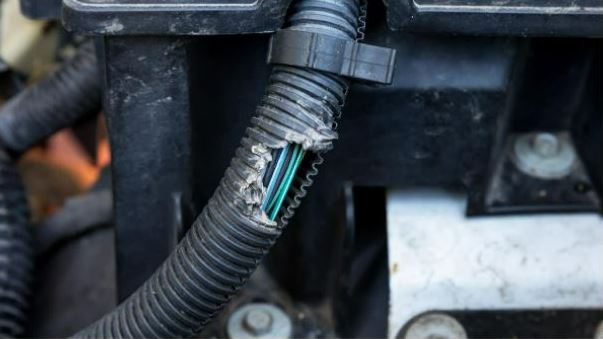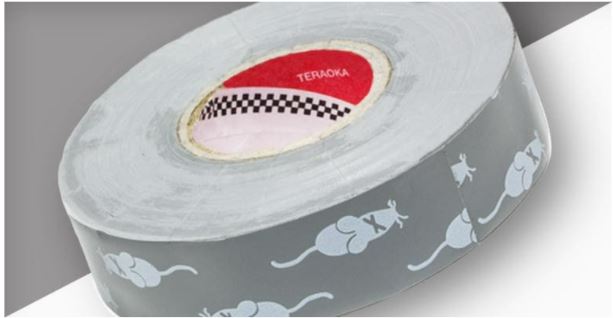Clever solutions to critters nibbling at your wires

Rats! You can buy the most reliable car on Earth and still find convoluted electrical gremlins, fluid leaks, and even outright failure when rodents take up residence and begin chewing on wiring, hoses, plastic, and other critical car parts.
This is especially a risk for cars stored over the winter, and those that have been parked for extended periods during the pandemic.
Rodent-inflicted damage is an age-old problem that some observers say is increasing as automakers use more plant-based biodegradable materials to reduce waste. Several class-action lawsuits have been filed against major automakers in recent years alleging that soy-based products were to blame, but these court cases were later dismissed.
Pest control company Terminix considers the temptations of tasty materials to be a myth, and instead, it blames rodent biology and their need to constantly chew, thereby preventing their teeth from growing too long. It turns out that feasting on cars is more prevalent than you might think.
We uncovered various technical service bulletins from Ford, General Motors, Honda, Toyota, and Subaru instructing their technicians how to remedy chewed wiring harnesses.
Some Consumer Reports staffers also have stories of small, furry creatures chewing through power steering lines, filling engine intakes with acorns, and plugging up air-conditioning ducts with their nests.
The problems can be severe, ranging from clogging the air filter with nesting materials to damaging the engine wiring harness, which can cost thousands to replace.
“If you see damage from rodents, take action immediately to both deter the animals and keep your car running,” says John Ibbotson, Consumer Report’s chief mechanic. “Chewed wires are a serious concern and will require professional assessment and potentially repair.”
If the wire coating is chewed through, exposing the inner wire, the car may not be safe to drive. In such cases and should be inspected by a qualified technician.
Periodically look for signs of furry visitors, such as droppings, urine, scratches, chewed wire, damaged belts, gathered nesting materials, and exposed fiber insulation. Glen Ramsey, senior technical services manager for pest control company Orkin, provides a key reality check.
“There is a myriad of reasons why we’ve seen an increase in rodent sightings throughout the pandemic," he tells CR. "First and foremost, people have spent more time at home over the last year than probably ever before. When we’re home, we notice more.”
But that doesn’t mean the rodent threat hasn’t become a real problem.
“Pandemic-driven restaurant closures forced rodents to find new food sources," Ramsey explains. "Without restaurant waste to dine on, rodents started scavenging new areas, often into residential communities that were still producing food waste.”
If you suspect that you do have a rodent problem, inspect and clean the car outside while wearing protective rubber gloves: Rodents can carry diseases.
Here are some other tips to keep your vehicle rodent-free.
How to Avoid Attracting Critters
- Ideally, park away from places that are known to draw rodents, such as near trash bins or natural food sources, such as vegetable gardens.
- Park in a sealed garage, if possible, and keep the doors closed.
- Make sure the garage doesn’t have stored food and prime nest materials like newspapers, cardboard, straw, rags, and patio furniture cushions.
- Look for gaps around garage windows and doors for possible places that rodents can sneak in. Weather strips under side doors can help seal them. Likewise, inspect the vertical seals on retractable garage doors for damage.
- Don’t store trash cans used for food waste in the garage.
- Keep the car interior free from food wrappers; their scent can draw rodents.
- Move the car regularly, discouraging varmints from taking up residence. And occasionally honk the horn before starting the car to scare away any napping critters.
How to Get Rid of Furry Vandals

Honda rodent-deterrent tape.
There are specially made spray products that promise to deter rodents that you could mist under the hood and around the vehicle, if garaged. Peppermint oil and cayenne pepper are reported to deter rodents. Note that spray products will need to be reapplied routinely, because they can wear away and rinse off.
There are ultrasonic devices that emit sounds to deter rodents, but at a frequency that humans can’t hear. However, their effectiveness is in doubt.
For storage, placing mothballs under the hood can help. (Don’t use them inside the car, or you’ll be stuck with that awful smell.)
There is a clever solution in a TSB from Honda: rodent-deterrent tape, essentially an electrical tape treated with super-spicy capsaicin, which Honda describes as “the stuff that puts the fire in a bowl of five-alarm chili.” The tape (part number 4019-2317) comes in a 20-meter roll, about 22 yards, and it is available through dealers and available online ($43).
We bought a roll of Honda’s rodent-deterrent tape to check it out. Beyond the cute rat graphics and gray color, it deceptively seems like regular electrical tape to us humans. There is no tear-inducing odor, but it does carry a label that warns against prolonged exposure to skin. Despite dares and double dares, we did not taste it and will trust that it is potent enough to deter even the most ravenous varmint.
Other suggestions for dealing with rodents under your hood include installing a metal mesh around wiring harnesses and rubber hoses and across any openings where rodents could crawl into your ventilation or intake systems.
Placing rodent traps around the garage can reduce the population, but just be careful of exposing domestic animals and children to poisons or dangerous snap traps.
If the rodents are winning the war despite following these tips, reach out to a local pest control service. They are trained in how to best combat stubborn rodent issues and can address your specific challenges.